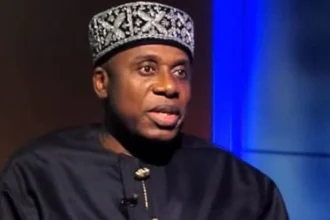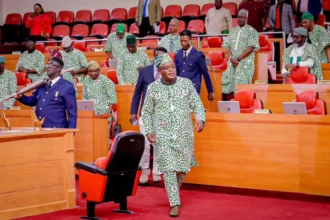...To get all news updates, Join our WhatsApp Group (Click Here)
Also Join our WhatsApp Channel (Click Here)
The Independent Corrupt Practices and Other Related Offences Commission (ICPC) has described the petition of the Civil Societies Coalition for the Emancipation of Osun State against Governor Rauf Aregbesola as baseless and unsubstantiated.
ICPC, in a letter with reference number ICPC/INV/NGB/T.E2/003, addressed to the petitioner, Chairman, Civil Society Coalition for the Emancipation of Osun State, which was copied to the Osun Secretary to the State Government stated that it’s investigations have not established an act contrary to the Corrupt Practices and other Related Offences Act, 2000 as none of the allegations were substantiated.
The commission stated that having diligently investigated the allegations and finding nothing against Governor Aregbesola, the allegations have been dismissed.
The Government, through the Bureau of Communication and Strategy in the Office of the Governor, reminded Nigerians that the ICPC’s final decision was a vindication of the repeated claims by the government that the group was one of individuals hired for the purpose of tarnishing its name.
ICPC, in the letter titled, Re: Petition against Osun State Governor- Mr. Rauf Adesoji Aregbesola, for criminal and reckless mismanagement of Osun State funds since November 2010 to August 2015 held that all of the allegations brought forward have been looked into conclusively with no infraction substantiated.
According to ICPC, “The above case bordering on fraudulent diversion of N11.4 billion obtained through Osun SUKUK bond to private foreign account, money meant for building of schools regardless of the N13.9 billion intervention funds from. The Federal Government through UBEC for the purpose of building classrooms has been investigated conclusively with no infraction substantiated.
“An investigation of the above allegations confirmed that Osun State government raised N11.344 billion from the issue of the SUKUK bond through Nigerian commercial banks. Investigation also revealed that after the issue of the bond, Osun State Government sought and got approvals from the Securities and Exchange Commission and Shariah Board of Lotus Capital Ltd. To amend the schedule of schools to be constructed from 27 mixed schools to 11 high schools and to furnish the schools. The approval of SUKUK holders is still pending.
“Also contrary to the allegation that the SUKUK proceed was diverted to private foreign account, it was disbursed from Osun SUKUK company accounts with 13 Collecting Nigerian Commercial banks and used for payments of contractors awarded the contracts of construction and furnishing of 11 senior Secondary Schools in various part of Osun State.
“Furthermore, contrary to the allegation that N13.9 billion was disbursed by UBEC to Osun State, the total of N7,192,585,041.64 has been disbursed to Osun SUBEB for the period 2011-2015. This amount consists of Universal Basic Education matching grants, Special Education Funds, Teachers Professional Development Fund and state’s counterpart funds lodgement in line with UBE Act 2004.
“In view of the above paragraphs, investigations have not established an act contrary to the Corrupt Practices and Other Related Offences Act, 2000 as none of the allegations were substantiated. Therefore the matter is hereby laid to rest”. The Commission said.
The Director, Bureau of Communication and Strategy, Office of the Governor, Mr. Semiu Okanlawon, stating the Government’s position over the outcome of the ICPC’s investigations, said the Aregbesola government was never in doubt that the group was an illegal one which was only being used by traducers of the administration to diminish its many achievements.
“When the so-called group was everywhere making its highly irresponsible and frivolous allegations, we never minced words on the fact that it was an unregistered group of few disgruntled, hired individuals to tarnish the image of the government and seek to diminish the massive good governance initiatives that are the hallmarks of our interventions here.
“The ICPC’s dismissal of the frivolous allegations is a vindication of our earlier position on the group and other collaborators in their ignoble campaigns of calumny.
“The Aregbesola administration has instituted the most transparent, people friendly government in its six years and more and we do not intend to depart from this path. This is because we are convinced in this lies the brighter future of our dear state,” Okanlawon added.
You can get every of our news as soon as they drop on WhatsApp ...To get all news updates, Join our WhatsApp Group (Click Here)
Also Join our WhatsApp Channel (Click Here)









